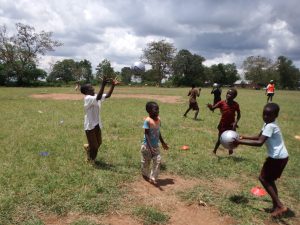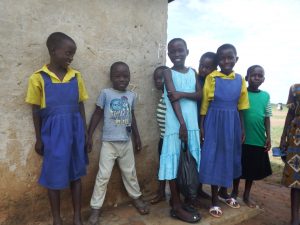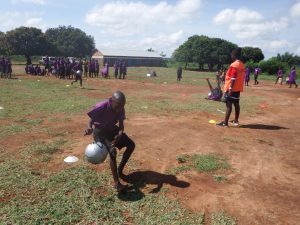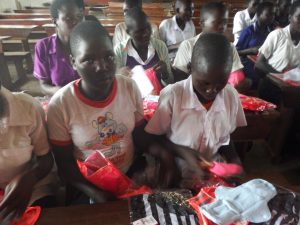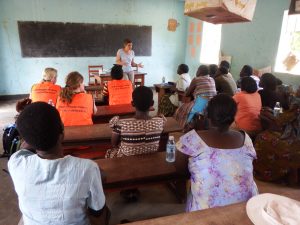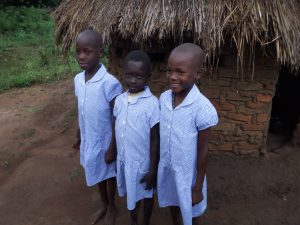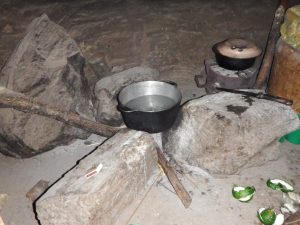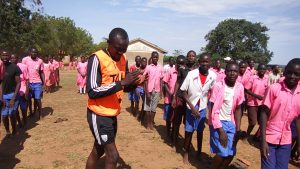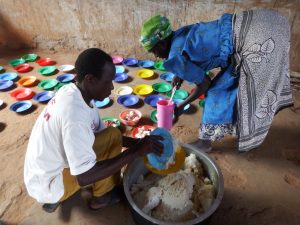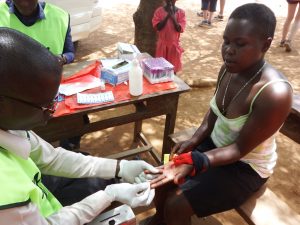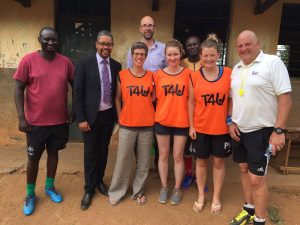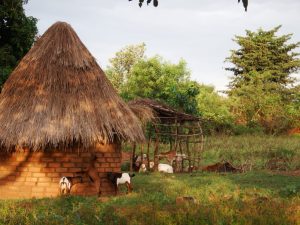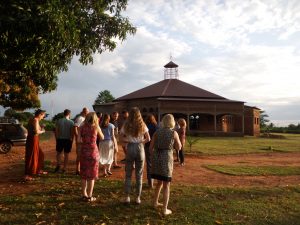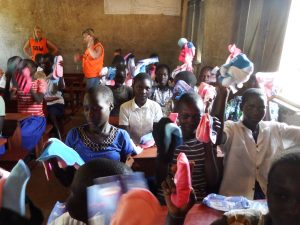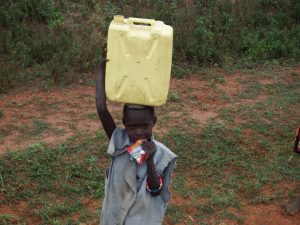Teams4U is a charity that brings volunteers from the UK to make a difference in children’s lives in countries including Bosnia, Belarus, Romania, Sierra Leone and Uganda. This was my third visit with Teams4U to the Mukongoro district of Kumi Region, Uganda, to participate in their work with schools to improve public health. In recent months Teams4U’s attention has focused on reducing the days missed from school due to sickness and diarrhoea. An intervention to improve hygiene and sanitation has been developed.
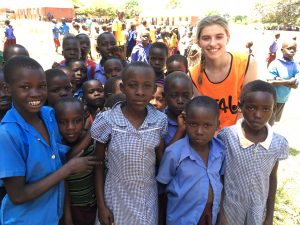
Basic sanitation
There is no water supply or electricity supply to the public schools, although there is typically a hand pump installed at the perimeter of the school grounds, which is shared resource for the school and the local public. There are usually three or four pit latrines for the children to use. The latrines often have no doors for privacy and used by around 1000 children, making the smell and flies unbearable. There is no source of water nearby for hand washing.
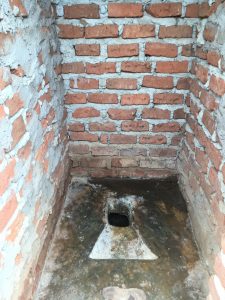
When children are at home, there are also often no hand washing facilities. Each day water is carried from the nearest hand pump and stored in water containers for cooking and washing, but many homesteads lack a drum with a tap for easy hand washing. Some families are not aware of the importance of hand washing to prevent disease.
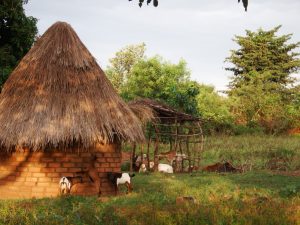
Sanitation solutions
A ‘Tippy tap’ is a contraption that is simple to make with a small water container, rope and wooden supports. A child can easily tip the drum to let the water out by using the foot operated lever. They are suitable for use at a homestead. Some schools have been using them, although a single tippy tap is inadequate for the typical school which has over 1000 children.
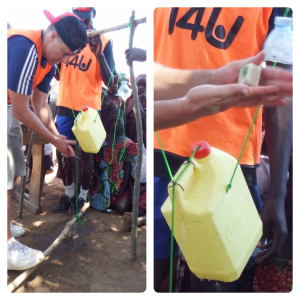
With support from the Welsh Government, Teams4U have begun to install simple hand washing facilities, comprising a large tank with two taps and bars of soap on string. These tanks can store sufficient hand washing water for a whole school. They still require filling by hand, but schools arrange teams of children to carry water from the pump to the tank as part of their daily chores. The tanks can be drained during holidays to allow them to be cleaned. Some schools fill their tanks with soapy water to get over the problem of soap bars going missing.
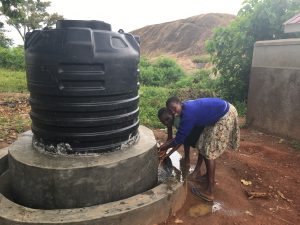
The Teams4U installation also includes ‘toilet flappers’ fitted to each of the long drop latrines and signage about hand washing on the walls. The toilet flappers are simple devices that remain closed to seal off the odours and stop flies from entering the long drop. They function similarly to the flaps in the portable toilets that are used in festivals in the UK.
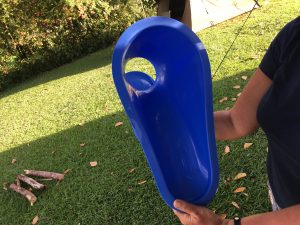
Volunteers get involved
The whole school also watched as Teams4U volunteers acted out a hand washing story about a Ugandan boy who does not wash his hands and becomes ill. In the story he then learns about hand washing and when to wash hands. The story features the family’s naughty goat, who causes great hilarity amongst the children when he runs amok. The use of the tippy tap is demonstrated, and the boy learns how and when to wash his hands properly. He learns to wash his hands after handling animals, after using the toilet and before meals. He finds in the future he is no longer ill.
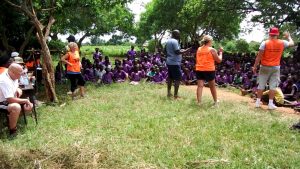
As in previous trips, the Teams4U volunteers visit a school each day for seven days. The morning activity is a physical activity intervention where all 1000 or so children take part in simple team games. In the afternoon, there are sessions for the older children that focus on puberty, development and respect for women. These have been the subjects of my previous blogs. There is also an opportunity for volunteers to play with the children. The challenge is to think of activities that overcome the language barrier and can be done with hundreds of children at a time! Successful activities include simple face painting, balloons and bubbles.
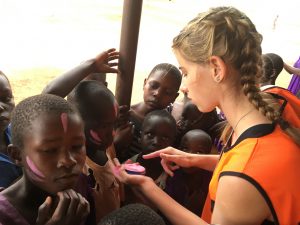
Click here to see a film of a volunteer entertaining the children with bubbles
https://www.facebook.com/penny.cook.75436/videos/10156365190389821/?t=1
The interventions with the children are supported by an education programme for the key church leaders, health care workers and senior women teachers. This is supported by funding from the Department for International Development (DFID). The training aims to provide a legacy for the ongoing education of the children in hygiene and disease prevention, dignity and respect, puberty, menstruation and sexual health.
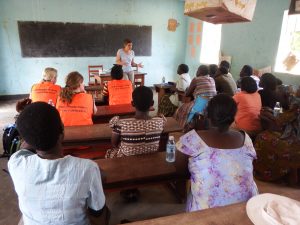
How do we know it works?
The onus is on the charity sector to deliver an intervention that has a lasting impact. At schools we visited, there is evidence of previous well-meaning interventions that have had no impact. I asked why the schools needed Teams4U’s water drums when some had evidence of large water storage drums. I was told that the drums had been designed to collect rain water, but no one had ever installed the guttering to harvest the water. Boxes containing computers sit unopened in schools that have never had an electricity supply.

In addition to the work to educate local leaders on how to sustain the benefits of the interventions, Teams4U will be collating data on school attendance in the coming weeks in order to determine whether the hygiene interventions have had an impact on absence due to diarrhoea. The aim will be to provide the intervention to all 150 primary/junior schools in the Mukongoro district. The charity has already demonstrated that its puberty and development sessions (‘Develop with Dignity’) are effective: knowledge of menstruation increased after the education sessions, and fewer girls miss school because of their periods.
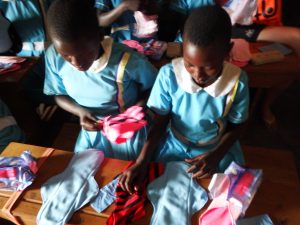
Get involved
You can join in and help run the sports, ‘Develop with Dignity’ and sanitation programmes. Read more about volunteering opportunities on the Teams4U website. If you come as part of the University of Salford’s BSc Public Health and Health Promotion, you can also help us do research to evaluate the programme during a heavily subsidised 10 day trip (the students pay £200 towards the cost of the trip).
A powerful experience for the volunteers
It is difficult to describe the pure pleasure that these children get from a little attention from the visitors. The impact on the volunteers is also profound as we experience the simple joy that children get from a hand shake or a stream of bubbles. It is also humbling to think how we take our children’s education for granted. In Kumi, there are no staff to clean the school. The sweeping of the classrooms, the fetching of the water and the cleaning of the toilets is all done by the children. Some of the forward thinking schools grow their own vegetables, and the children also tend to these. In several of the schools we are greeted with songs of welcome. The children also sing songs that describe how seriously they take their learning in order to better their lives. We found this truly humbling.
